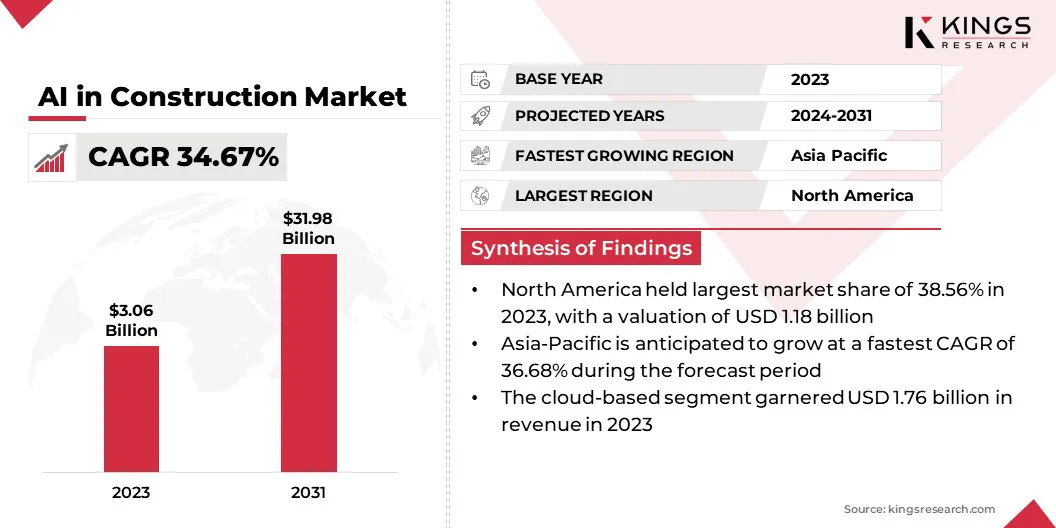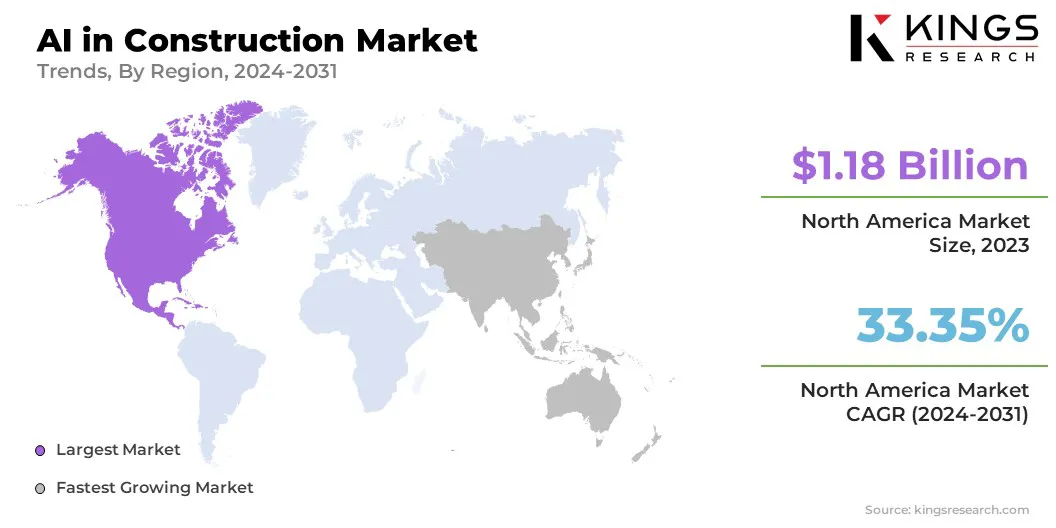ICT-IOT

AI in Construction Market

AI in Construction Market Size, Share, Growth & Industry Analysis, By Solution (Project Management, Risk Management, Schedule Management, Supply Chain Management, Others), By Deployment (Cloud-based, On-premises), By Stage (Pre-construction, Construction, Post-construction), By Construction (Residential, Industrial, Commercial, Infrastructure), and Regional Analysis, 2021-2031 2024-2031
Pages : 120
Base Year : 2023
Release : December 2024
Report ID: KR1131
AI in Construction Market Size
Global AI in Construction Market size was recorded at USD 3.06 billion in 2023, which is estimated to be valued at USD 3.98 billion in 2024 and is projected to reach USD 31.98 billion by 2031, growing at a CAGR of 34.67% from 2024 to 2031.
Advancements in AI and machine learning technologies and the increasing adoption of AI-powered project management tools are augmenting the growth of the market. In the scope of work, the report includes products offered by companies such as Procore Technologies, Inc., Autodesk, Inc., Bentley Systems, Incorporated, Oracle, Trimble Inc., Doxel, NVIDIA Corporation, Dassault Systèmes, Microsoft, SAP SE, and others.
The use of AI in modular and prefabricated construction is revolutionizing the design and construction of structures. AI technologies are enabling precise design customization, optimizing material usage, and streamlining the manufacturing process for modular components. This efficiency reduces construction timelines, minimizing waste and enhancing sustainability.
AI-driven tools can analyze project requirements and automate the design of prefabricated modules, ensuring seamless component integration during assembly. Furthermore, AI-powered robotics and automation are enhancing production accuracy in factories, while reducing labor costs and minimizing human error.
- For instance, in February 2024, Autodesk launched Autodesk Informed Design, a cloud-based solution that integrates design and manufacturing workflows. It enables architects to use customizable building products and manufacturers to share product data with stakeholders, promoting industrialized construction. Part of the Design and Make Platform, it accelerates sustainable, streamlined building design and is available globally as a free add-in for Revit and Inventor.
This opportunity is fueled by the increasing demand for affordable housing, with modular construction offering a solution to shortages through scalable, high-quality structures.
Additionally, cloud-based AI platforms are used for real-time monitoring and management of prefabrication processes, ensuring transparency and collaboration among stakeholders. As modular construction becomes a preferred choice for urban development and infrastructure projects, AI is expected to play a crucial role in advancing this method .
Artificial Intelligence (AI) in construction refers to the application of advanced machine learning algorithms, predictive analytics, and automation tools to enhance efficiency, accuracy, and safety across construction processes. AI solutions in construction often involve cloud-based platforms that integrate data from various sources such as Building Information Modeling (BIM), sensors, and drones to provide actionable insights.
These solutions can predict project delays, optimize resource allocation, and identify design flaws before construction begins. AI applications in construction include project management, risk assessment, cost estimation, and on-site safety monitoring. AI-powered tools analyze vast datasets to forecast potential challenges such as weather disruptions or equipment failures, enabling timely interventions.
The use of cloud computing ensures that AI tools are accessible and scalable, allowing project managers, architects, and engineers to collaborate seamlessly in real-time. By combining data-driven insights with automation, AI is transforming traditional construction practices, making them more adaptive, sustainable, and responsive to modern demands.

Analyst Review
The global AI in construction market is witnessing significant growth, mainly aided by the strategic initiatives of key players aimed at technological advancements and industry expansion. Companies are prioritizing investments in AI-powered solutions to address industry challenges such as inefficiencies, cost overruns, and safety concerns.
Their strategies often focus on integrating AI with existing construction technologies, such as BIM and IoT, to create holistic solutions that improve decision-making and operational workflows. Market growth is fueled by the rising adoption of cloud-based AI platforms, which provide scalability and enable seamless collaboration across stakeholders.
- In October 2024, Bricsys, a division of Hexagon, launched BricsCAD V25, introducing enhanced CAD, BIM, and Mechanical software solutions. The virtual event showcased over sixty smart features aimed at streamlining workflows and accelerating design processes. New tools in BricsCAD Lite V25, BricsCAD Pro V25, and BricsCAD BIM V25 support easier, faster drafting, and open BIM modeling on a DWG platform.
Furthermore, key market participants are forming strategic partnerships with construction firms and software providers to boost AI adoption and expand their customer base.
Imperatives for these companies include developing user-friendly AI tools, ensuring data security, and addressing the lack of skilled personnel to operate AI systems. With sustainability becoming a critical focus, several companies are leveraging AI to promote eco-friendly construction practices, positioning themselves as leaders in this transformative market.
AI in Construction Market Growth Factors
Advancements in AI and machine learning technologies are a driving transformative changes in the construction industry. These innovations enable algorithms to analyze vast datasets, identify patterns, and make highly accurate predictions, improving decision-making processes throughout all construction phases. Modern AI tools can optimize resource allocation, schedule tasks effectively, and predict potential project risks, such as equipment malfunctions or material shortages.
- For instance, in May 2024, Autodesk Inc. introduced Autodesk Forma, an AI-powered suite for early-stage design. Its features, including Rapid Noise Analysis, Rapid Wind Analysis, and Rapid Operational Energy Analysis, enable designers to predict environmental impacts and optimize building performance by analyzing geometry and construction types, thereby enhancing design efficiency and sustainability.
Machine learning, in particular, empowers construction firms to create predictive maintenance schedules, automate repetitive tasks, and enhance design accuracy by integrating with tools such as BIM.
Furthermore, real-time data analytics and AI-powered visualization tools are enabling seamless communication among stakeholders, reducing errors and ensuring alignment on project goals. This is fostering AI adoption, fueled by advancements in computing power and cloud-based solutions. As AI and machine learning technologies evolve, they are expected to foster innovation, efficiency, and sustainability in the construction sector.
High initial implementation costs pose a significant barrier to the widespread adoption of AI in the construction industry. These costs are primarily due to the need for advanced hardware, software, and skilled personnel, and the integration of AI tools with existing systems. Small and medium-sized enterprises (SMEs), in particular, may face challenges in allocating the substantial upfront investment required for AI adoption.
Despite these challenges, the long-term benefits of AI, including improved efficiency, reduced project delays, and enhanced safety, can offset these costs over time. To mitigate this barrier, companies can explore cost-sharing models, government subsidies, or strategic partnerships with technology providers. Additionally, adopting modular AI solutions that can be scaled gradually allows businesses to manage costs effectively while delivering immediate value.
Another approach involves leveraging cloud-based AI platforms, which reduce the need for heavy on-premise infrastructure investments. By strategically addressing these financial barriers, construction firms can facilitate AI adoption and capitalize on its transformative benefits.
AI in Construction Market Trends
The rising demand for autonomous construction equipment is reshaping the construction landscape, supported by the need for increased productivity, precision, and safety. These AI-enabled machines, including drones, robotic excavators, and autonomous cranes, are designed to perform tasks with minimal human intervention. Equipped with sensors, cameras, and machine learning algorithms, they can navigate complex environments, detect obstacles, and complete operations efficiently.
- For instance, in May 2024, Develon showcased its innovative machinery and digital solutions at the Intermat Exhibition in Paris. Key highlights included the Concept-X 2.0 autonomous equipment, featuring the DD100-CX dozer and DX225-CX excavator. Their 2,024 m² booth emphasized sustainability, focusing on carbon reduction, innovation, green solutions, and compact technologies to fosterfuture advancements.
Autonomous equipment reduces reliance on manual labor, which minimizes the risk of workplace accidents by automating high-risk tasks. This trend is gaining momentum due to labor shortages and rising project complexities in the construction industry. Furthermore, the integration of AI with IoT devices enables real-time data exchange, enhancing the coordination and performance of autonomous equipment.
Companies adopting these technologies benefit from faster project completion, reduced costs, and improved resource utilization. Advancements in AI and robotics continue are bolstering the adoption of autonomous construction equipment, making it a key element of modern construction practices.
Segmentation Analysis
The global market has been segmented based on solution, deployment, stage, construction, and geography.
By Solution
Based on solution, the market has been segmented into project management, risk management, schedule management, supply chain management, and others. The project management segment dominated the AI in construction market in 2023, securing the largest share of 26.12%. This expansion is primarily due to the critical role of AI in enhancing project efficiency and reducing delays.
AI-powered project management tools streamline various aspects of construction, including scheduling, resource allocation, and real-time monitoring of progress. These tools analyze historical and real-time data to provide predictive insights, enabling proactive decision-making and mitigating risks associated with delays or cost overruns.
Additionally, the growing adoption of building information modeling (BIM) systems integrated with AI has significantly contributed to the growth of the segment, allowing for improved collaboration and accuracy during planning and execution. Cloud-based AI solutions have further amplified this growth by enabling seamless communication across stakeholders and providing on-demand access to project data.
As the construction industry increasingly adopts digital transformation strategies, the project management segment is expected to witness robust growth, propelled by the continuous advancements in AI technologies and the rising demand for efficient construction workflows.
By Deployment
Based on deployment, the market has been classified into cloud-based and on-premises. The cloud-based segment is anticipated to grow at a remarkable CAGR of 35.14% over the forecast period, primarily fueled by the demand for scalable, cost-efficient, and collaborative solutions.
Cloud-based platforms offer unmatched flexibility, allowing construction firms to access AI tools without investing heavily in on-premise infrastructure. These solutions are valued for centralizing data from diverse sources, including sensors, drones, and BIM models, enabling real-time insights and remote monitoring of projects.
The rise of remote work and geographically dispersed construction teams has further propelled the adoption of cloud-based AI, facilitating seamless collaboration and decision-making across locations. Additionally, advancements in cloud computing technologies, coupled with the integration of robust security protocols, have mitagated data breaches concerns, promoting broader adoption.
By Construction
Based on construction, the market has been divided into residential, industrial, commercial, and infrastructure. The commercial segment led the AI in construction market in 2023, generating a revenue of USD 1.15 billion. This expansion is mainly bolstered by the increasing adoption of AI technologies in large-scale commercial projects.
This growth is further attributed to the need for enhanced efficiency, cost control, and safety in the construction of office spaces, retail centers, and hospitality infrastructure. Commercial projects typically involve complex workflows and require robust coordination among multiple stakeholders, making AI-driven solutions such as predictive analytics, project management tools, and autonomous equipment indispensable.
Rapid urbanization and infrastructure development initiatives, particularly in emerging economies, has fueled the development of the commercial segment. AI's ability to optimize energy efficiency and sustainability in commercial buildings has gained immense traction, supporting global green construction goals.
Moreover, the integration of AI with advanced technologies such as IoT and digital twins has enabled real-time monitoring and performance optimization, contributing significantly to the growth of the segment.
AI in Construction Market Regional Analysis
Based on region, the global market has been classified into North America, Europe, Asia-Pacific, MEA, and Latin America.

North America AI in construction market accounted for a major share of 38.56% and was valued at USD 1.18 billion in 2023, characterized by the region’s advanced technological infrastructure and widespread adoption of AI solutions in the construction sector. The United States and Canada are at the forefront of this growth, owing to significant investments in smart city projects and large-scale infrastructure development.
The construction industry's focus on improving efficiency, safety, and sustainability has led to the adoption of AI-powered tools such as predictive analytics, autonomous equipment, and cloud-based project management solutions. Furthermore, the region's robust ecosystem of AI developers and startups has fostered innovation, enabling tailored solutions for construction firms.
Regulatory support for green building initiatives and energy-efficient construction practices has promoted the use of AI to optimize resource management and minimize waste. Rapid urbanization and an increase in commercial and residential projects are projected to sustain North America's dominance in the market, supported by continuous technological advancements and strategic partnerships.
Asia-Pacific is poised to grow at the highest CAGR of 36.68% in the AI in construction market thought the projection period. This prominence is facilitated by rapid urbanization and infrastructure development in countries such as China, India, and Southeast Asian nations.
The regional market is witnessing a surge in demand for smart solutions to address labor shortages, rising costs, and increasing project complexities. Governments in the region are actively investing in large-scale infrastructure projects, including smart cities, transportation networks, and renewable energy facilities, creating a conducive environment for AI adoption.
Additionally, the growing awareness of sustainable construction practices has propelled the integration of AI for optimizing energy usage and reducing material wastage. The availability of cost-effective AI solutions and the rising penetration of cloud technologies further support regional market growth.
As construction firms in Asia-Pacific increasingly adopt AI-driven tools for automation, safety monitoring, and predictive maintenance, the regional market is expected to lead globally in leveraging AI for transformative advancements in construction practices.
Competitive Landscape
The global AI in construction market report will provide valuable insight with an emphasis on the fragmented nature of the industry. Prominent players are focusing on several key business strategies such as partnerships, mergers and acquisitions, product innovations, and joint ventures to expand their product portfolio and increase their market shares across different regions.
Strategic initiatives, including investments in R&D activities, the establishment of new manufacturing facilities, and supply chain optimization, could create new opportunities for market growth.
List of Key Companies in AI in Construction Market
- Procore Technologies, Inc.
- Autodesk, Inc.
- Bentley Systems, Incorporated
- Oracle
- Trimble Inc.
- Doxel
- NVIDIA Corporation
- Dassault Systèmes
- Microsoft
- SAP SE
Key Industry Developments
- November 2024 (Launch): Procore Technologies launched its AI-driven Procore AI solutions to enhance project efficiency and decision-making. Powered by Procore’s unified platform, Procore AI includes features such as Procore Agents, Insights, and Copilot, designed to streamline workflows and collaboration. This innovative solution enables smarter project execution and improved forecasting, driving success in the construction industry.
The global AI in construction market has been segmented as:
By Solution
- Project Management
- Risk Management
- Schedule Management
- Supply Chain Management
- Others
By Deployment
- Cloud-based
- On-premises
By Stage
- Pre-construction
- Construction
- Post-construction
By Construction
- Residential
- Industrial
- Commercial
- Infrastructure
By Region
- North America
- U.S.
- Canada
- Mexico
- Europe
- France
- UK
- Spain
- Germany
- Italy
- Russia
- Rest of Europe
- Asia-Pacific
- China
- Japan
- India
- South Korea
- Rest of Asia-Pacific
- Middle East & Africa
- GCC
- North Africa
- South Africa
- Rest of Middle East & Africa
- Latin America
- Brazil
- Argentina
- Rest of Latin America
CHOOSE LICENCE TYPE
Frequently Asked Questions (FAQ's)
Get the latest!
Get actionable strategies to empower your business and market domination
- Deliver Revenue Impact
- Demand Supply Patterns
- Market Estimation
- Real-Time Insights
- Market Intelligence
- Lucrative Growth Opportunities
- Micro & Macro Economic Factors
- Futuristic Market Solutions
- Revenue-Driven Results
- Innovative Thought Leadership
.webp)